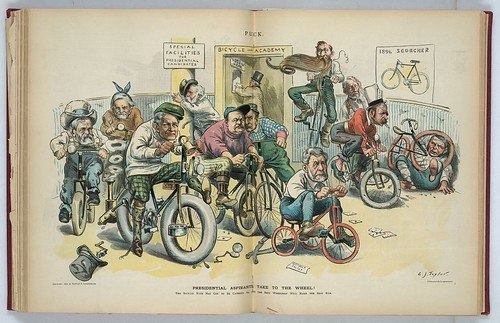
Illustration from Puck [magazine], v. 37, no. 953, (1895 June 12), centerfold - click on image for a more detailed view
Title: Presidential aspirants take to the wheel! / C.J. Taylor.
Summary: Print shows the interior of the "Bicycle - Academy" which offers "Special Facilities for Presidential Candidates", and trying out bicycles are several candidates labeled "Harrison, Sherman, Allison, Morton, Tom Reed, McKinley, Stewart, [Hill], Flower, Cullom, [and] Peffer". Morton rides a motorized bicycle, Allison rides a tricycle, Flower has put his head through the front spokes, Stewart hangs onto a column, McKinley appears to be hanging onto Reed, and Hill's tires are leaking air. On the wall is a poster for an "1896 Scorcher".
Contributor Names: Taylor, Charles Jay, 1855-1929, artist
Created / Published: N.Y. : Published by Keppler & Schwarzmann, 1895 June 12.
Presidential aspirants take to the wheel! The bicycle vote has got to be catered to, and the best wheelman will make the best run.
At this point, the bicycle craze of the 1890s was building up - many cyclists went to indoor training programs to learn how to ride. Here, the presidential candidates are depicted learning how to ride in order to get the "wheelman" (cyclist) vote. Surprising number of candidates, although compared to what we have been through now . . .
Of course, at this point there were zero automobiles.
Also, looking at these presidential candidate names - Harrison, Sherman, Allison, Morton, Tom Reed, McKinley, Stewart, [Hill], Flower, Cullom, Peffer - most are completely unfamiliar a little over one hundred years later.
No comments:
Post a Comment